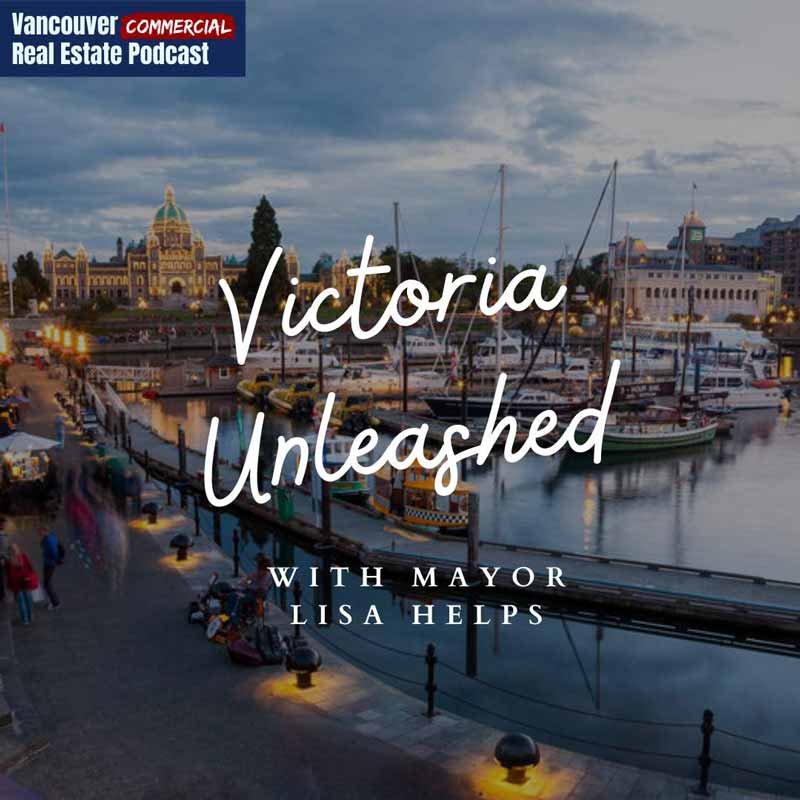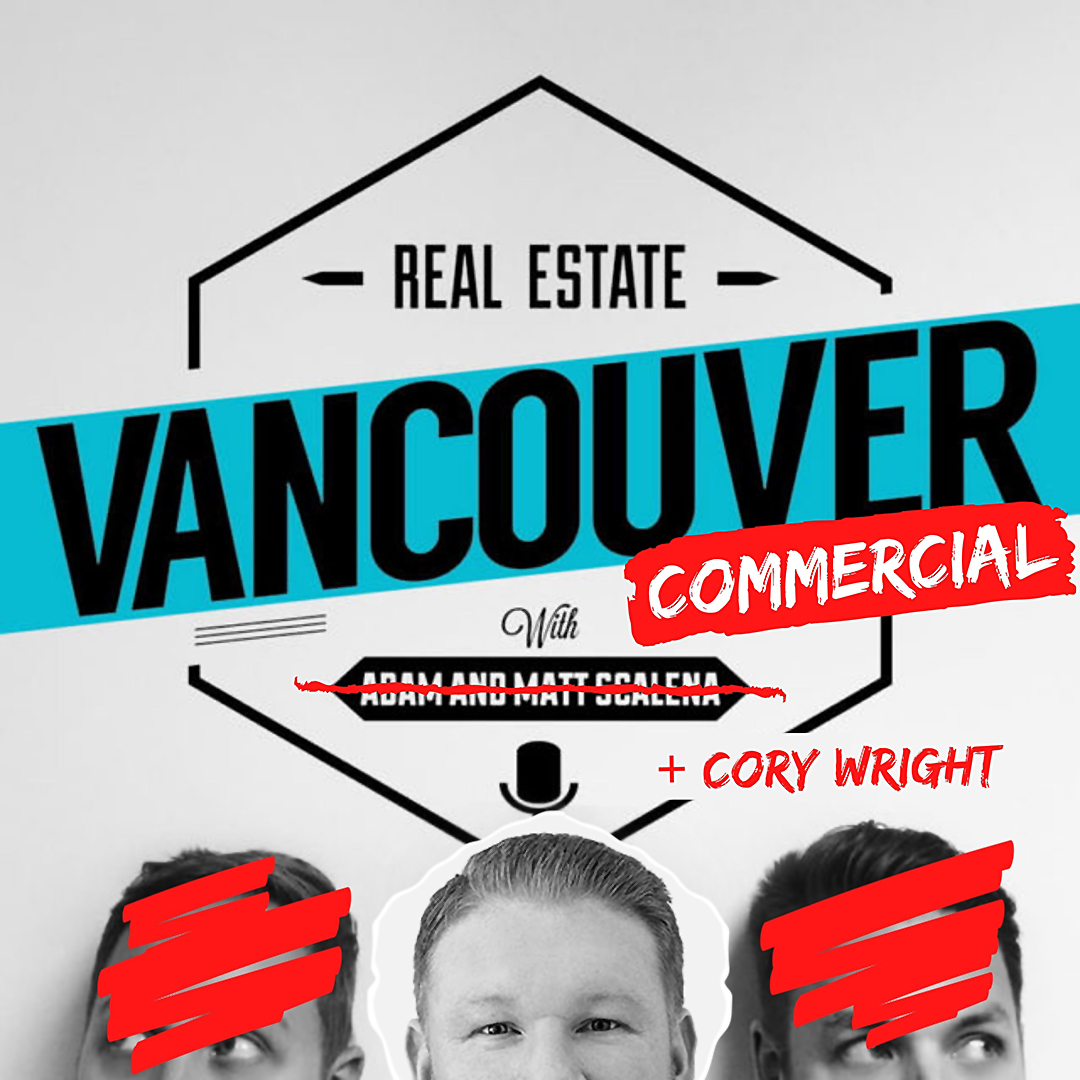
Powered by RedCircle
On a national and provincial level, one of the most exciting real estate markets has been Victoria. This week, Cory and Adam welcome onto the show none other than Mayor of Victoria, Lisa Helps.
Mayor Helps unpacks how Victoria got to where it is today, the goals she has accomplished in her eight years as mayor, and unveils what’s in store for BC’s capital city, including the exciting areas to watch, highlighting all the development happening throughout the downtown and surrounding areas.
For two years in a row, Victoria has been our pick for best market to invest in, and after this episode, you will see why.
How has Victoria changed during the pandemic?
Like many cities across the country, Victoria faced dire circumstances for our small businesses throughout the pandemic. It was a huge time of uncertainty for a lot of people. Many of our businesses in Victoria are small and local, so there were many challenges here. Victoria is a global tourist destination, and that dried up as well.
Another major challenge we faced was shelters closing. People with already precarious housing ended up living outside as bubbles closed.
On the positive side, what has also changed in Victoria is a deeper collaboration between people who never thought they would work together and greater problem solving.
Victoria has gone through a major development boom in recent years. Can you tell us more about Victoria’s experience with development and investment?
Victoria has seen a tremendous building boom in the last few years. In 2021, our building permit values were $700 million – the highest on record. When I was elected in 2014, I wanted to help unleash Victoria’s potential, which includes housing and real estate development.
Victoria is in a cycle of building right now, which I think is a good thing. We need housing but also high quality office spaces for the many companies starting and relocating here. We passed the Official Community Plan (OCP) in 2012 and now we’re bringing it to life.
What development projects in Victoria have caught your eye recently?
There were two 21-storey towers built near Harris Green – one was market condos and one was below market condos. 71% of people who moved into those buildings were Victorians moving out of the rental market. It was our first experience building high in Victoria.
There’s also a 25-storey building in the Hudson District that I can see from my window in City Hall. We’re starting to see a lot of purpose-built rental and many projects under construction in the Harris Green area. For example, there’s one development building on top of a funeral chapel on the ground level. It looks spectacular!
Another project I’m excited about is the city’s new fire hall. We’re rebuilding the fire hall and will have 130 affordable rental units on top of it. It’s going to be a gorgeous building.
Chard Development has worked on many projects in Victoria, like Nest and Haven, and has partnered with BC housing. How is Victoria on the forefront of partnering with BC Housing and creating affordable housing opportunities?
Both of those Chard Development projects are so different and they’re both excellent. Haven is a below-market affordable home ownership project in association with BC Housing. I believe it’s 107 units and they only have seven units left. The top profession moving into that building is nurses, as it’s very close to the hospital.
Almost 100% of the people moving into Haven are local Victorians coming out of the rental market. Which means we’ve freed up 107 rental units for other people. We have to look at the relationship between the rental and buying markets.
Has there been any pushback from the community in Victoria about the amount of development happening?
There’s been a lot of push forward, actually. People in their 20s and 30s are coming to city council meetings and telling us this is their city and they need a place to live. That’s why we’re seeing the development that we’re seeing.
How is Victoria tackling housing affordability?
In Victoria, we’re taking a three-prong approach to housing affordability and attainability. Our first step is newly adopted legislation that allows affordable housing projects, co-op housing, government housing and non-profit housing to skip the political process and be built up to the maximum density in the OCP, as long as design guidelines are followed. That can happen anywhere in the city.
I think we’ll see huge dividends from this change in the next few years as it saves 9+ months and millions of dollars. It also allows developers to get funding. We’re starting to see an uptick in these types of housing projects around the region.
We have two other areas that we’re focusing on in regards to affordability that are coming soon. The first is to pre-zone land in village centres and corridors for rental housing. It would de-risk rental housing and speed up the process.
Lastly, we want to rezone the entire city to allow for missing middle housing. So anywhere a single family home can be built without political process or input from the public, we’d allow for house-plexes and townhomes on single family lots. That would be the biggest move of all and could have a profound impact on the City of Victoria.
Gentle density in all neighbourhoods is what we’re moving towards. It shouldn’t take 2-3 years to bring townhouses into a neighbourhood.
What areas of Victoria are you seeing being improved by development?
I believe a parking lot is the worst possible urban land use in the 21st Century.
Reliance Properties purchased an area of land north of downtown to rezone six acres for residential, light industrial and artist studio use. That will be a big improvement to that area. We do need industrial land but there are a lot of low-performing parking lots and single-storey buildings in that area that could be improved.
Right by City Hall is an old heritage building that was burnt down. There’s a new hotel planned for that site that is going through the development process right now. They’re partnering with the Metis Nation, so I think that will be a very good project.
Chard Development has a new project at Douglas and Discovery. Would this project qualify under the new legislation to skip the political process?
Yes and no. That project by Chard is spectacular. BC Housing bought the hotel there and has a 90-unit supportive housing project coming in. It’s separate from the Chard project but connected. So BC Housing’s project will qualify under the new legislation, unless there’s a change to the OCP.
The Chard side of the development is a combination of affordable rentals, market rentals and condos. So no, it wouldn’t qualify for the expedited process but we are trying to move it through as quickly as possible.
The new Chard Development project is a great model for what housing should look like in BC. It’s going to have a large grocery store, public plaza, childcare facilities and over 400 units of housing. We’re starting to see more of these creative partnerships in Victoria to help deliver housing across the sectors with amazing amenities.
How can municipalities tackle housing supply? Should the provincial government step in to address housing supply?
I think municipalities can tackle increasing housing supply more effectively, such as through the moves Victoria is in the process of taking. If we can complete our three-prong approach, that will make it easier and cheaper to increase housing supply. If municipalities want to increase supply, they need to let people build up to the OCP.
In 2019, the province of BC mandated that local governments complete housing needs assessments so we know how much housing we need. These are mandated every five years and conducted by external consultants.
The province should require local governments to meet the number of houses that their assessment says they need to build. It should be that simple. Pass legislation saying, “You must produce X housing units within Y years.” And then leave it to us.
If municipalities can’t figure out how to meet their housing supply objectives, the province could start prioritizing infrastructure money to communities that are building the amount of housing they need. It makes sense, because communities with more homes and more people would need more infrastructure investment.
The province doesn’t want to get involved in the municipal planning processes. They want to leave it to us, but with a bit more pressure than we are seeing right now.
What’s at risk if we don’t tackle housing affordability?
Everything is at risk. I have never seen anything like the housing affordability crisis that we’re seeing now. It’s all related. If we don’t have enough housing for the people working in our neighbourhoods, we won’t have the staff. That means our economy and our healthcare system are at risk. Housing is fundamental to everything.
And it’s not just a Victoria problem. We’re seeing housing issues across urban British Columbia. Getting the supply and the right supply is critically important.
What is Victoria’s potential?
Hopefully after eight years as mayor, we have unleashed some of Victoria’s potential. We set a goal of 70% occupancy in hotels in Victoria in the off-season and we achieved that goal. The retail vacancy rate in downtown Victoria before I was elected was over 10%. Pre-pandemic, it was down to 3.4%. And even now, we’re well under 10%. We have seen the entrepreneurial ecosystem and tech industry really explode here.
Victoria is seen as more of a global city now than it was eight years ago. So Victoria’s potential has been unleashed and now we need to run with that momentum.
What are your hopes for Victoria over the next 10 years?
Victoria can and should continue to lead in innovative housing policy. We have a goal to have 75% of all trips be made by transit, walking or cycling by 2030. We want to hit net zero emissions as soon as possible and have a climate leadership plan in place to do that. We have an ambitious zero waste strategy. I think Victoria can be a leader in sustainability, affordability and innovation.
Find out more: lisahelpsvictoria.ca
For all the curious minds interested in commercial real estate investing, grab a coffee and pull up a chair because we have exclusive stories and tips from commercial real estate brokers, investors, developers, economists, urban planners, and everyone in-between. From the successes and failures to the motivations and lessons learned, the Vancouver Commercial Real Estate Podcast is your insight into commercial real estate in Vancouver, Victoria, Kelowna, and beyond.
What's the best real estate market to invest in? What are the commercial real estate asset classes and property types? Hosted by Cory Wright, founder of William Wright Commercial, and co-hosts Adam and Matt Scalena of the Vancouver Real Estate Podcast, our podcast opens the door to real estate investing for everyone from beginner investors to experienced real estate professionals. New episodes are released every Tuesday. Follow the Vancouver Commercial Real Estate Podcast on Apple Podcasts, Spotify, Google Podcasts, or your favourite streaming platforms.

This communication is not intended to cause or induce breach of an existing agency agreement. E&OE: All information contained herein is from sources deemed reliable, and have no reason to doubt its accuracy; however, no guarantee or responsibility is assumed thereof, and it shall not form any part of future contracts. Properties are submitted subject to errors and omissions and all information should be carefully verified. All measurements quoted herein are approximate.
ⓒ William Wright Commercial Real Estate Services 2024
Proudly designed by Burst Creative